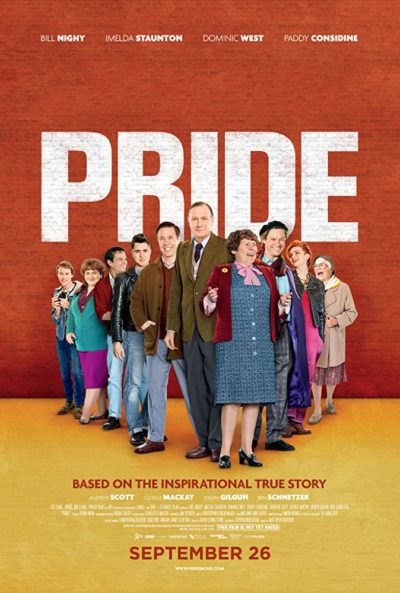
Despite how it dominated the news for so long in the 1980s, the miners strike of that time is badly under represented on film. I can only think of the terrific Brassed Off and the overrated Billy Eliott as examples where the dispute played a significant part in the plot. This emotional, heartbreaking effort, based on a true story, demonstrates that a compelling, involving film can still be made about the historical strike 30 years after it happened.
Spotting parallels with how they have been treated by the government and the press a small group of gay men and women in London form a group – Lesbian and Gay Men Support the Miners (LGSM) – to raise funds for the striking miners. Despite initial resistance from the people they are trying to help, they begin to form very close bonds with one small mining town in South Wales that has been devastated by the industrial action.
Peppered with both funny and truly tear jerking moments, this is stirring stuff. The mid 80s, that curious time of society becoming ever more divided by unchecked Thatcherism is tremendously evoked and the tentative friendships formed between the two disparate groups of people is both touching and believable.
The performances from the familiar faces are as good as you would expect. Particularly noteworthy are Paddy Considine as the open minded, dignified, leader of the mining community, Bill Nighy, toning down his normal mannerisms as a retired miner with a dark secret and Imelda Staunton at her formidable best.
Andrew Scott (most famous as Moriarty in BBC TV’s Sherlock) gives a career best, very nuanced, performance as Gethin, one of the older members of the LGSM who has to face his own personal family issues on returning to Wales. Despite those towering performances, some of the lesser known cast members also shine, particularly Joseph Gilgun as the practical Mike and Faye Marsay as the sole lesbian in the initial group.
I really am struggling to find much to criticise in this intelligent film. There are just a couple of minor quibbles. The sequence where the women from the Welsh town visit gay bars and clubs in London is a little clichéd although it provides some easy laughs, and an invented character – a naïve youngest member of LGSM – was not necessary as it feels like he is from another lesser movie. However, neither of those things should detract from your enjoyment of this film.
As well as the main themes of the story, the subject of AIDS is handled subtly, and all the more effectively for it. The final scenes of the miners arriving to take part in a gay pride march, accompanied by one of Billy Bragg’s most evocative songs will bring a lump to many people’s throats. An important and hugely enjoyable film that I am expecting to be showered in BAFTA nominations next year.
Rating: 9 out of 10